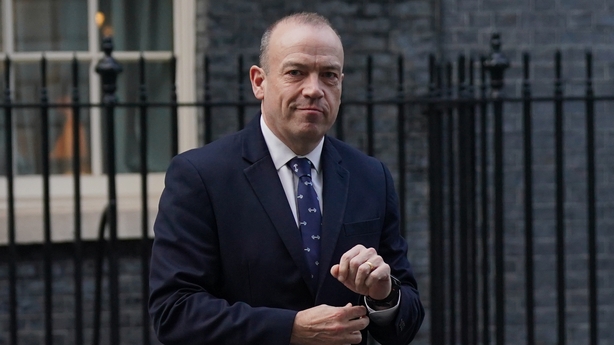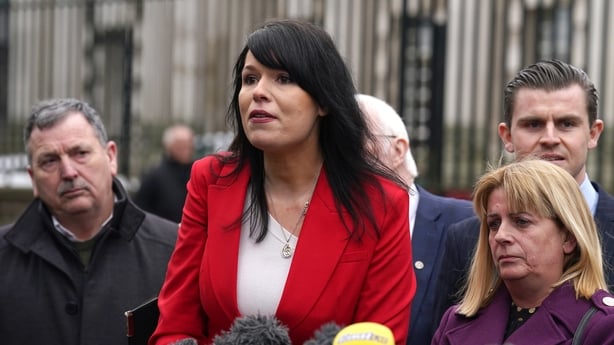The Irish Government is "not surprised" by the Belfast High Court's ruling that the Northern Ireland Legacy Bill is not compatible with human rights legislation, Tánaiste and Minister for Foreign Affairs Micheál Martin has said.
The court found provisions for conditional immunity from prosecution for Troubles offences in the British government's legacy act are not compatible with human rights laws.
Delivering the judgment, Mr Justice Adrian Colton said there was no evidence the immunity provision would in any way contribute to reconciliation in Northern Ireland.
The Northern Ireland Troubles (Legacy and Reconciliation) Act received royal assent in September despite widespread opposition from political parties, victims' organisations in Northern Ireland and the Irish Government.
Aspects of the laws include a limited form of immunity from prosecution for Troubles-related offences for those who co-operate with the new Independent Commission for Reconciliation and Information Recovery (ICRIR).
We need your consent to load this rte-player contentWe use rte-player to manage extra content that can set cookies on your device and collect data about your activity. Please review their details and accept them to load the content.Manage Preferences
The act will also halt future civil cases and legacy inquests.
Speaking in Dublin after the ruling, Mr Martin said the Irish Government had "reluctantly" taken the case on the basis of "very catagorical legal advice on the non-compliance of the legacy act" to the convention.
He claimed the judgment "reflects and underpins" the course of action which the Irish Government has taken.
A number of relatives of those bereaved by the violence are seeking to have the controversial legislation overturned.
Mr Justice Colton told the court: "I am satisfied that the immunity from prosecution provisions under section 19 of the Act are in breach of the lead applicant's rights pursuant to Article 2 of the ECHR (European Convention on Human Rights).
"I am also satisfied they are in breach of Article 3 of the ECHR."
He added: "There is no evidence that the granting of immunity under the Act will in any way contribute to reconciliation in Northern Ireland, indeed the evidence is to the contrary."

Secretary of State for Northern Ireland Chris Heaton-Harris said the British government remained committed to the Northern Ireland Troubles (Legacy and Reconciliation) Act.
"We do remain committed to implementing the legacy act," he told the British parliament.
Shadow Northern Ireland secretary Hilary Benn told the Commons: "Given that immunity has always been presented as the central foundation of the legacy act, what do ministers intend to do about this judgment and how can the Commission became operational when one of its central powers has just been struck down?"
Mr Heaton-Harris replied: "As I say, this is a very complex case. Over 200 pages which were just being reported on less than 90 minutes ago, and so it will take some time to consider.
"But we do remain committed to implementing the legacy act, including delivering the ICRIR."
'Hugely significant' day - Amnesty International
Amnesty International UK's Northern Ireland Deputy Director Grainne Taggart said her organisation welcomed the decision, describing today as "hugely significant" and the first round of something that still has a while to go.
She told RTÉ's Drivetine that there are now big questions for the Northern Ireland Secretary of State in terms of what is next for the law and that he will have to consider the judgment carefuly.
Ms Taggart said Amnesty is calling on Mr Heaton-Harris to repeal the legislation and replace it with something capable of delivering for victims.
She said that there is a political question for the UK government over how the ICRIR will operate and investigate Troubles-related offences.
She added that a key part of the law itself and the body was the immunity from prosecution, which is now no longer there, and that point has to be addressed.
"Amnesty will continue to stand with victims until such times as we have processes that prioritise victims and have them at the centre and ultimately vindicate their rights," Ms Taggart said.

Legislation being challenged by Irish Govt
Critics have labelled it a bill of shame and say it is designed to protect former British soldiers.
Nineteen separate legal challenges were lodged against the act, but a judge consolidated them into one lead case.
Those mounting the challenge are supported by Amnesty International.
The judicial review was heard over eight days in the High Court in Belfast in November.
During the hearings, lawyers for those seeking to have the legislation deemed unlawful argued that it would prevent them from ever receiving either truth or justice and is in breach of human rights legislation.
John Larkin KC, a former Northern Ireland Attorney General, told the court they were being subjected to "secondary trauma" because their hopes of securing justice where being shut down.
He said those taking the case "are representative of the enormous and collective pain in this jurisdiction" and that their hurt was so intense, no words of his could possibly do them justice.
The lawyer said they had been victims of "horrific events" and wanted those responsible to be held to account.
But a lawyer for the British government argued that the legislation is an attempt to achieve reconciliation while preserving victims' rights.
Tony McGleenan KC described the series of legal challenges as "an unprecedented attempt to block a sovereign Act of Parliament".
He also said perpetrators who fail to "earn" conditional amnesties by revealing the truth about their activities to the ICRIR would face the prospect of prosecution and imprisonment.
"The sword of Damocles hangs over all those who participated in Troubles-related offences," Mr McGleenan said.
The legislation received Royal Assent in September last year despite being opposed by all of the main political parties in Northern Ireland, victims' organisations and the Irish Government.
The Irish Government announced in December that it is challenging the UK legislation in the European Court of Human Rights.
Victims need to be heard - PSNI
PSNI Chief Constable Jon Boutcher has said that anything done about legacy has to be done with the support of victims and "that isn't happening".
Mr Boutcher said that he will support the work of the commission from 1 May, "if that's the only show in town, we've got to make it work", he said.
He said that victims need to be listened to, but the fact that there is now a legacy bill is progress.
"It should take into account the needs of victims it should be focused on what victims are saying.
"I think the bill does need to adjust and improve and I think having spoken to Declan Morgan [head of a proposed new commission to deal with Troubles cases] there is a genuine intent to make it work for victims but time will tell".
Additional reporting Laura Hogan, Paul Cunningham, PA







